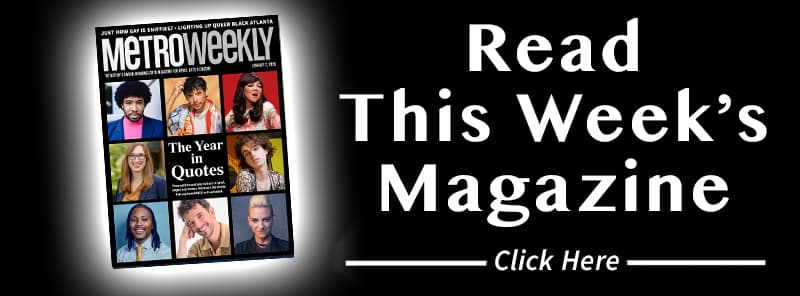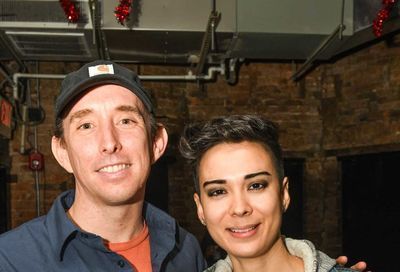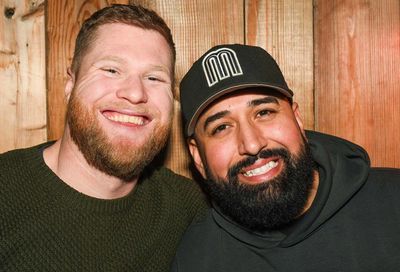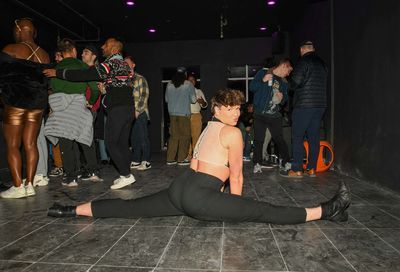The Return of the Capital Fringe Festival
The Capital Fringe Festival returns with two weekends of eclectic performances, all from vacant stores in Georgetown.

“I bought fifteen hundred tests, and we’re going to test the performers every day,” says Julianne Brienza, founding director of the Capital Fringe Festival. “We’ve got to, because we’re in a pandemic. I know everyone’s acting like it’s over, but it’s not.”
She continues: “It’s a lot, doing live theater during a pandemic. Just ensuring it’s a safe environment and the shows can move forward. And [hoping] we don’t get too many positive cases — because the festival is only eight days, so if someone tests positive, their entire [appearance] is canceled.”
Brienza is taking the ongoing threat of COVID contagion very seriously, requiring proof of vaccination and the wearing of face masks of everyone involved.
Yet even she has her limits.
“No one wants to watch a show [performed by] someone masked. It’s just not happening,” she says. “I mean, I am not sitting through that. I can’t be running an organization that sells tickets to masked performances. Like, no.”
Brienza is gearing up for the first Fringe Festival in three years, since COVID forced the cancellation of what would have been the 15th annual event in 2020. In the years leading up to that milestone, Fringe had become a thriving operation, hosting live events and discussions from a brownstone in the Trinidad neighborhood of Northeast D.C. All these years later, that’s all gone.
“Fringe no longer owns a space, and we will not own a space in the future,” Brienza says. “It’s pretty complicated. It deserves its own article or entry into the record books. On the flip side, I am eternally grateful that I’m not running an indoor theater during this time period. Because that math and [those] finances do not work out at all. And that would be devastating to an organization like Capital Fringe. We wouldn’t survive.”
Things are dicey enough as it is. Even as recently as a few months ago, Brienza still wasn’t sure she could pull off a live, in-person festival — let alone have any idea where it might all go down.
“In planning the festival and trying to figure out how to come back, it became very apparent that we really could not afford to be in any of the more established venues in the city — just due to the increase in the rent and all the things that those venues themselves are dealing with,” she says.
“Actually, when I put out the call for applications for this year’s festival, we didn’t have any venues, and I didn’t have a way to solve that. But as has happened many times in Fringeland, the day I put that out, the Georgetown BID reached out and said, ‘We’d love to help you do the festival, and we’d love to find you some space.'”
As a result, Capital Fringe will host performances in six vacant properties in the Georgetown neighborhood.
“In the 17 years Fringe has been around, no one has ever offered free space, nor have I asked for it,” Brienza says, marveling at the turn of events. “And they are all really helpful. I’m constantly like, ‘Is this real?’ We have just never received that type of support, ever. So that’s been great.”
Sandlot Georgetown (2715 Pennsylvania Ave. NW), the outdoor park and bar just over the bridge from the West End, will serve as this year’s Festival Bar, featuring a Community Open Mic and a lineup of free music performances, offering discounts for festivalgoers.
All told, this year’s festival is significantly smaller in size and shorter in duration than any previous year’s offering, with 31 productions and 140 individual performances taking place over a total of eight days, this weekend and next.
“The shows themselves are all pretty diverse, as far as content,” Brienza says. “But they all really hover around the topics of human emotions [and] human psychology. There’s also cabaret performances where people are trying to sing songs to uplift people and just have us feel good in this moment.”
Nearly all of the performers this year are local to D.C. and the surrounding area, and many are new to the festival. In fact, Brienza notes, “a lot of the artists in the festival are between 18 and 25.”
Among the shows with LGBTQ appeal are:
Climate, Cancer, and 7 Celibate Men: A Queer Comedy, directed by Ali Miller and written and performed by Caroline Howe, described as “a coming of age and coming out adventure [exploring] queerness and resilience in the face of climate chaos.”
What They Said About Sex, Steve Budd’s comedic mashup of personal storytelling and documentary theater featuring stories and secrets from “a gay man, a tantric sex practitioner, a trans man, and a sex-positive octogenarian.”
The Body Show, an LGBTQ-inclusive showcase of 10 area storytellers, directed by Mikala Jamison, sharing personal stories about “body image, body changes, finding peace in their bodies, and the tricky business of the physical self.”
SWB – Strangers with Benefits, a drama, directed by Christina A. Coakley, in which playwright Shadia A. Hafiz will be joined by Harrison Smith to act out a casual encounter between two kink-positive adults who just might be each other’s “sexual soulmate.”
Sheboygan, the debut play by noted D.C. novelist Louis Bayard, brought to the stage by actors Jonathan Atkinson, Zack Powell, and Kimberly Schraf, directed by Craig Wallace, and described as a “tragicomedy inspired by recent news events” in which a grieving academic learns that his late husband was hiding a secret concerning racial identity.
Sobriety of Fear, a revised reprisal of the 2018 Capital Fringe “Best of the Fest” winner, a one-man show from writer/composer/performer Shaun Michael Johnson and directed by Mediombo Singo Fofana.
And A Number, a drama by acclaimed British playwright Caryl Churchill, presented by The Edge of the Universe Players 2 and featuring Jacob Yeh and David Bryan Jackson, directed by Stephen Jarrett, described as a “sparse, complex play that digs into complicated moral issues” centering on a father reconnecting with his estranged sons.
Brienza is trying to take everything in stride and have a cautiously optimistic outlook.
“I’m giving it a shot. I’m giving it a shot. I think it’s all going to be good,” she says. “It’s just the testing and that vibe, it sucks. I don’t want to test people. But I think it’s the safest thing to do.” –Doug Rule
The Capital Fringe Festival 2022 runs this weekend and next, through Sunday, July 24, at various locations in Georgetown.
Tickets are $15 to all shows. For dates and venues of all the shows listed above, and the rest of the festival’s offerings, visit www.capitalfringe.org.
Support Metro Weekly’s Journalism
These are challenging times for news organizations. And yet it’s crucial we stay active and provide vital resources and information to both our local readers and the world. So won’t you please take a moment and consider supporting Metro Weekly with a membership? For as little as $5 a month, you can help ensure Metro Weekly magazine and MetroWeekly.com remain free, viable resources as we provide the best, most diverse, culturally-resonant LGBTQ coverage in both the D.C. region and around the world. Memberships come with exclusive perks and discounts, your own personal digital delivery of each week’s magazine (and an archive), access to our Member's Lounge when it launches this fall, and exclusive members-only items like Metro Weekly Membership Mugs and Tote Bags! Check out all our membership levels here and please join us today!
























You must be logged in to post a comment.